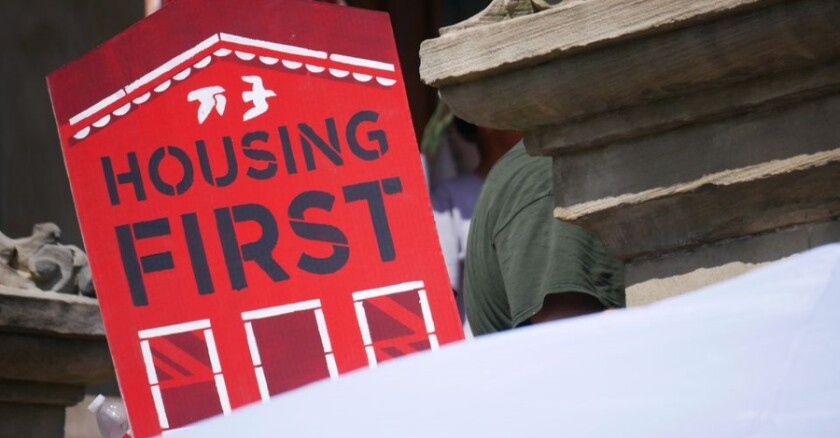House Bill 4919, the “Homeless Bill of Rights,” has been receiving its first hearings in the Capitol as Rep. Emily Dievendorf, D- Lansing, guides it through a legislature that has a sympathetic but slim Democratic majority.
The goal of her bill, she told a House subcommittee Thursday, is to create a “bare minimum” by “establishing a measure of humanity for unhoused residents.” It ensures, regardless of someone’s housing status, equal access to public services, including rights to personal property, to emergency medical care and to move freely in public spaces.
Other core components include rights to equal treatment by state and municipal agencies, for homeless youth to be enrolled in school and to freedom from discrimination in employment when lacking a permanent mailing address.
“Any of the examples where somebody could possibly be denied the services and spaces that we all already have access to,” Dievendorf said, “a houseless person would be able to file a civil suit.”
More than 8,000 people were homeless on a given night in Michigan last year, according to a report from the National Alliance to End Homelessness. And more than 30,000 different people experienced homelessness in Michigan in all of 2021, the latest year the state has data.
Homeless people suffer from “stereotypes and assumptions,” Dievendorf said, like behavior, dangerousness and undesirability. Her bill ensures, for example, they can’t be arrested for being in a park or have their belongings thrown away.
“Don’t treat people like crap, you’re not going to be sued,” she said. Connecticut, Illinois, Puerto Rico and Rhode Island have enacted similar legislation.
Homelessness across the nation has fallen since the COVID-19 pandemic, as safety net policies helped keep people housed. But local activists say they’re seeing increases.
“We’ve got to take this bull by the horns,” Lansing community activist William Walker told lawmakers. “He’s a powerful bull, he’s been around for a long time, and he is growing. The longer we allow him to grow, the harder it’s going to be to take him down.”
HB 4919 is a major part of Democrats’ efforts this year to tackle housing discrimination and high rents. Dievendorf toldMLivein August she expected 15 to 20 bills on housing inequality this fall. Among the topics:
- Clarifying tenants’ rights to organize
- Requiring landlords pay for relocating tenants with red-tagged buildings, deemed unsafe for occupancy
- Establishing standard criteria for what is a safe and livable dwelling
Renters Rights Initiatives Heard
The housing subcommittee on Thursday also worked through two more bills.
HB 4891 would require landlords to refund application fees for prospective tenants whose applications were denied. If a tenant doesn’t get a refund, they could sue for $1,000 in damages. Landlords would not need to refund a background check fee if they give the applicant a copy of the report.
The subcommittee advanced HB 4891, which is sponsored by Rep. Joey Andrews, D- St. Joseph, to a full committee.
The subcommittee also heard HB 4878, which would generally prevent landlords from considering a rental applicant’s criminal record. That means their arrest record, any convictions as an adult or juvenile and any participation in a diversion program.
“If I decided to shoplift 10 years ago,” said sponsoring Rep. Abraham Aiyash, D- Hamtramck, “that has no bearing on whether or not I can pay rent if all my financial records can attest – and my job history can attest – that I can secure stable employment and finances to then pay for that rent.”
Here’s how his bill would work: When landlords run a criminal background check on a prospective tenant, they could only consider felony convictions within the last 365 days, any prior convictions for arson or human trafficking and whether the applicant is a sex offender.
If the check reveals these things, Aiyash told subcommittee members, the landlord must conduct an “individualized assessment” that considers the person’s age when committing the crime, the crime’s nature and severity and whether it was connected to a rental property.
The applicant can then provide documentation of their rehabilitation efforts, and if they feel their rights were violated under this law by being denied a home, they could file a complaint with the Michigan Attorney General.
Detroit, Ann Arbor, Kalamazoo and Jackson have all recently passed similar so-called fair chance housing ordinances. Michigan’s law would be modeled after New Jersey’s.
“This is not a novel idea, this is not a new idea, but it is an important idea to make sure that we can address some of the concerns of people not having access to housing,” Aiyash said.
©2023 Advance Local Media LLC. Distributed by Tribune Content Agency, LLC.











